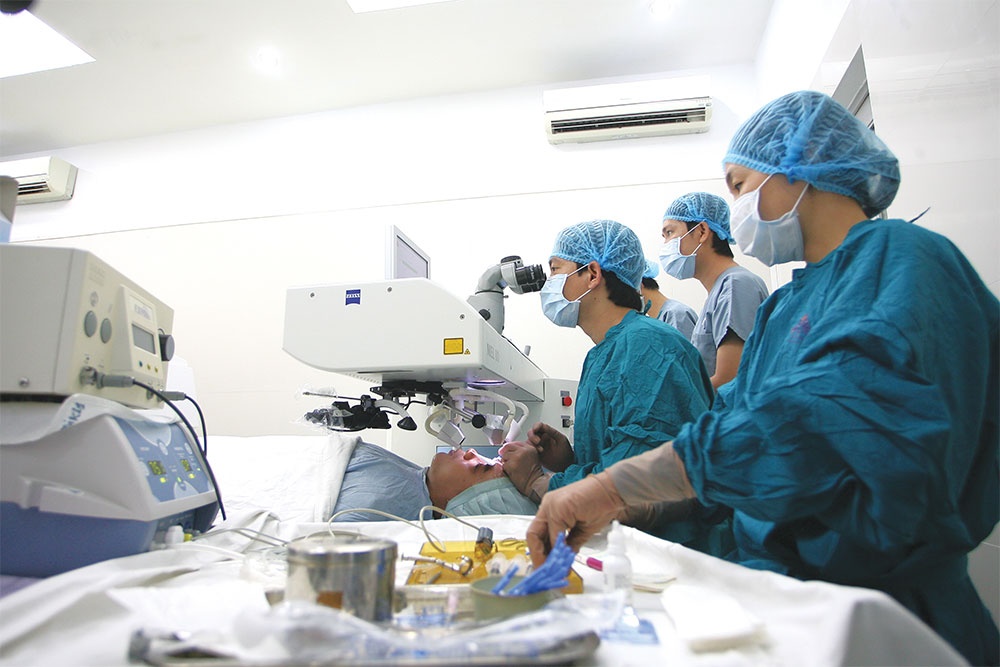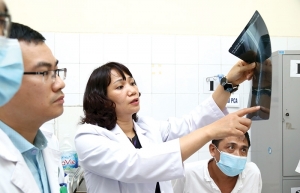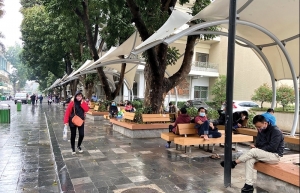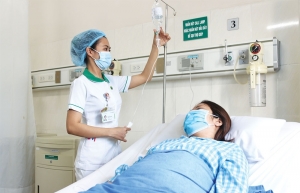Hospital autonomy success hangs on fixes
The National Assembly (NA) in has been discussing amendments to the Law on Medical Examination and Treatment, with hospital autonomy being among the top talking points, as NA deputies raised numerous concerns over feasibility and failures.
 |
| A pilot for some state-owned hospitals were first approved in 2019, photo Le Toan |
NA deputy Pham Khanh Phong Lan representing Ho Chi Minh City said that the regulations in the draft amended law are yet to comprehensively deal with the thorny problem related to hospital autonomy.
“It is important to have official activities to review and assess hospital autonomy at health facilities so we can learn lessons, and then have solutions so that we will have regulations that are more appropriate and relevant with practical situation,” she recommended.
NA deputy Nguyen Cong Long from the southern province of Dong Nai raised concerns over the schedule to adopt the draft amendments because there are many issues in need of further discussions.
“The law needs to add more clear regulations about autonomy of hospitals and health facilities to solve the existing problems,” Long noted. “Medical examination and treatment costs in the draft amended law do not yet provide clear rules for full calculation. It is necessary to check the whole law in a comprehensive manner because many policies might not come into effect until 2027, or even 2032.”
Financial autonomy began in 2002 through a decree on revenue-generating public service entities, including those in the healthcare sector, and was replaced in 2006 with the addition of human resource (HR) management requirements.
Seeing hospital autonomy as important and consistent with current development trends in Vietnam, helping strengthen the health sector as a whole by making it more cost-effective and less wasteful, the government in 2019 issued Resolution No.33/NQ-CP approving the pilot of comprehensive autonomy at four state-owned hospitals.
Under this, hospitals were able to make decisions about the prices of medical and treatment services in line with the price frame issued by the Ministry of Health (MoH). However, according to hospitals, the medical pricing framework is now outdated. Meanwhile, there is no ceiling price for customised medical services, making it difficult to decide on reasonable prices. Moreover, the hospitals still have no right to self-control their organisation, prices, human resources, and other matters.
As a result, in October the Vietnam National Cancer Hospital (K Hospital) asked the MoH to remove it from the pilot list when its trial period came to an end. K Hospital made the move after Bach Mai Hospital proposed a halt to hospital autonomy altogether at a meeting in August with acting Minister of Health Dao Hong Lan, who has officially become the minister now.
While the so-called failure of the trial is partly blamed on the pandemic, lack of experience in implementation, and insufficient preparations and investment, experts said that the MoH should make changes to encourage hospitals to continue the process.
Nguyen Hai Dung, NA deputy representing the northern province of Nam Dinh, along with other deputies, acknowledged that some of the rules are problematic when applied at state-owned hospitals. “The National Assembly Standing Committee is considering reporting the shortcomings in regulations related to financial autonomy in the draft amended law so that they are timely solved. The law should be adopted at the next NA session,” he suggested.
Similarly, NA deputy Hoang Van Cuong from Hanoi noted that Vietnam’s most well-known hospitals are always in overload, and thus the current situation with comprehensive autonomy should be deemed a policy failure.
“The majority of doctors always expect their hospitals to have sufficient modern medical devices, drug supply, and medical supplies – and that they have the full right to select them for their most effective treatment regimens regardless of limitation in cost,” Cuong said. “Many patients are willing to pay high for best possible treatment services at state-owned hospitals. However, the facts show that they often end up spending money abroad or at international hospitals instead.”
 | Service boosts with hospital autonomy Hospital autonomy is proving to be an optimal solution to enable state-run hospitals to increase their operational efficiency, thus better benefiting locals. Nguyen Truong Son, Deputy Minister of Health, discussed with VIR’s Bich Thuy the solutions and lessons from other countries, as well as any complexities in the way. |
 | The way forward in hospital self-rule While hospital automation has proved some advantages of capital mobilisation and healthcare services expansion, some challenges remain and concrete actions are required to make it a greater success. Le Minh Sang, health specialist at World Bank Vietnam, analyses the difficulties and also the international lessons that the country can learn from. |
 | Hospitals bemoan autonomy trial flop After a trial period of two years, state-owned central hospitals are seeking to cease comprehensive autonomy because of financial challenges and legal complications, urging more legal changes ahead. |
What the stars mean:
★ Poor ★ ★ Promising ★★★ Good ★★★★ Very good ★★★★★ Exceptional
Themes: Healthcare Platform
- PM outlines new tasks for healthcare sector
- Opella and Long Chau join forces to enhance digestive and bone health
- Hanoi intensifies airport monitoring amid Nipah disease risks
- Cosmetics rules set for overhaul under draft decree
- Policy obstacles being addressed in drug licensing and renewal
Related Contents
Latest News
More News
- PM outlines new tasks for healthcare sector (February 25, 2026 | 16:00)
- Myriad risks ahead, but ones Vietnam can confront (February 20, 2026 | 15:02)
- Vietnam making the leap into AI and semiconductors (February 20, 2026 | 09:37)
- Funding must be activated for semiconductor success (February 20, 2026 | 09:20)
- Resilience as new benchmark for smarter infrastructure (February 19, 2026 | 20:35)
- A golden time to shine within ASEAN (February 19, 2026 | 20:22)
- Vietnam’s pivotal year for advancing sustainability (February 19, 2026 | 08:44)
- Strengthening the core role of industry and trade (February 19, 2026 | 08:35)
- Future orientations for healthcare improvements (February 19, 2026 | 08:29)
- Infrastructure orientations suitable for a new chapter (February 19, 2026 | 08:15)

 Tag:
Tag:



















 Mobile Version
Mobile Version